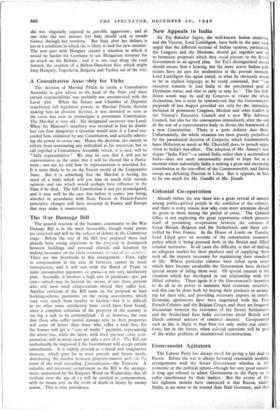New Appeals to India
Sir Tej Bahadur Sapru, the well-known Indian moderate, and the Viceroy, Lord Linlithgow, have both in the past week urged that the different sections of Indian opinion, particularly the Congress and the Moslems, should get together and try to formulate proposals which they could present to the British Government as an agreed plan. Sir Tej's distinguished record should ensure him a hearing, but the more active Indian poli- ticians have no ears for moderation at the present moment. Lord Linlithgow has again stated, in what he obviously meant to be as explicit language as he could command, that " our objective remains to lead India to the proclaimed goal of Dominion status, and that as early as may be." The last half- dozen words may be said by Congress to vitiate the whole declaration, but it must be remembered that the Government's proposals of last August provided not only for the immediate inclusion of prominent Congress, Moslem and other leaders in the Viceroy's Executive Council and a new War Advisory Council, but also for the convocation immediately after the end of the war of a representative body to devise the framework of a new Constitution. There is a quite definite date there. Unfortunately, the whole situation has been gravely prejudiced by the paradoxical decision of Congress, which fundamentally hates Hitlerism as much as Mr. Churchill does, to preach oppo- sition to India's war-effort. The adoption of Mr. Amery's new slogan "India First"—a united India rather than a sectionalised India—does not seem unreasonably much to hope for at a moment when industrially India is making a great and increasing contribution to the war-effort of the Commonwealth, and Indian troops are defeating Fascism in Libya. But it appears, in fact, to be too much for Mr. Gandhi or Mr. Jinnah.


























 Previous page
Previous page